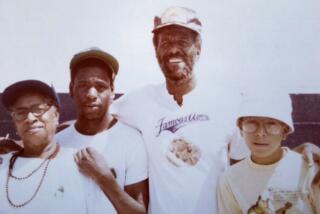Cookie’s Not Ready to Sell His Toys
- Share via
Cookie’s mom wants him to clean up his toys. It’s not an easy sell.
Cookie Cornett is 70, his mother, Edna, is 94, and the toys have taken over the family’s 8 acres in Loudoun County, Va.
In creaky sheet metal sheds and overflowing into the oak and sassafras forest, the former milkman has parked a hundred years of American history.
There are three hulking, turn-of-the-century agricultural steam engines, 55 tractors (many forged before the first World War), a 1903 Maxwell like the one Jack Benny used to joke about, a 1918 Indiana dump truck with wood around the windshield, and a 1940 Chevy his dad bought new.
His mom keeps telling Cookie to start selling. They may need the money, she says. He’s been in the hospital four times since Independence Day--complications from a life of diabetes. Why not unload some of it?
Cookie’s not listening.
“It’s endemic to a lot of 20th-century stuff,” said Darlene Richardson, a historian at Roanoke’s Virginia Museum of Transportation who has worked with the collections of aging railroad enthusiasts and others. “People just don’t know where to go. It’s the same with a lot of WWII vets ... There’s a lot of history out there [that] ends up at the flea market.”
Or it ends up underappreciated and sold cheap to pay taxes, said William Smith, executive director of the Antique Automobile Club of America.
“A lot of collectors are becoming senior citizens, and if they don’t come up with some kind of plan, it turns into a sad situation,” Smith said.
Cookie never married. He did go on some double dates with his sister Shirley Cornett and her friends. One made the mistake of sitting on the back of his car, and that was the end of her.
“He loves his stuff--oh, man,” Shirley, 57, said. “Just piddling with that stuff has been his entire existence.”
Cookie’s family moved to Loudoun about the time he lost his given name, Ernest, to a nanny who pointed out how much he liked to coo. He lugged 10-gallon cans of milk from Loudoun to Washington for the family business. Later, the family was evicted from its farm to make way for Dulles International Airport, and Cookie became a truck driver.
He started collecting with his father, William Jennings Bryan Cornett. The two of them, along with a few friends, were known as the Iron Men. For decades, they ran steam engines and tractor rides at the Waterford Fair, but that ended a couple of years ago when Cookie got too weak.
As Cookie heads past the 1919 green Rumely tractor with the red hand crank and into a makeshift garage, joy fills his voice.
“That one runs sweet,” he said of a Hupmobile sedan. Turning to the green 1940 Chevy, which he’d souped up, he said, “I got a little hot-roddy when my dad gave it to me in 1950.” And the blue Twin City tractor? “I’ve got to do some valve work on that,” he said.
But his body rebels.
“My future was to maybe restore some of it, one at a time. It seems like my health has failed me now, and I haven’t got much done,” he said. “I guess old age, it just sticks with you.”
His mother, who cares for them both, offers a little nudge.
“Gosh, when I was 70, I wasn’t even thinking about old age,” Edna said.
She’s worried they might need to hire a caregiver. She doesn’t want to enter a nursing home.
“I’d just as soon die,” she said.
Appraisers say Cookie could net $200,000 to $300,000 if he catalogued everything--a mix of high-priced gems, rare parts and tools, and rust-damaged flecks of history with little cash value--and auctioned it pieces at a time.
Jeffrey Locke, an appraiser who works with museums, sees an informative exhibit. A recording of his memories would also be a resource, Locke said. “It’s all in his head, and when his head goes, a wealth of material goes,” he said.
More to Read
Inside the business of entertainment
The Wide Shot brings you news, analysis and insights on everything from streaming wars to production — and what it all means for the future.
You may occasionally receive promotional content from the Los Angeles Times.










